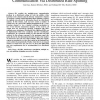Free Online Productivity Tools
i2Speak
i2Symbol
i2OCR
iTex2Img
iWeb2Print
iWeb2Shot
i2Type
iPdf2Split
iPdf2Merge
i2Bopomofo
i2Arabic
i2Style
i2Image
i2PDF
iLatex2Rtf
Sci2ools
CORR
2006
Springer
2006
Springer
Asymptotically Optimal Multiple-access Communication via Distributed Rate Splitting
We consider the multiple-access communication problem in a distributed setting for both the additive white Gaussian noise channel and the discrete memoryless channel. We propose a scheme called Distributed Rate Splitting to achieve the optimal rates allowed by information theory in a distributed manner. In this scheme, each real user creates a number of virtual users via a power/rate splitting mechanism in the M-user Gaussian channel or via a random switching mechanism in the M-user discrete memoryless channel. At the receiver, all virtual users are successively decoded. Compared with other multiple-access techniques, Distributed Rate Splitting (DRS) can be implemented with lower complexity and less coordination. Furthermore, in a symmetric setting, we show that the rate tuple achieved by this scheme converges to the maximum equal rate point allowed by the information-theoretic bound as the number of virtual users per real user tends to infinity. When the capacity regions are asymmetri...
CORR 2006 | Education | Rate Splitting | Real User | Virtual Users |
Related Content
| Added | 11 Dec 2010 |
| Updated | 11 Dec 2010 |
| Type | Journal |
| Year | 2006 |
| Where | CORR |
| Authors | Jian Cao, Edmund M. Yeh |
Comments (0)

